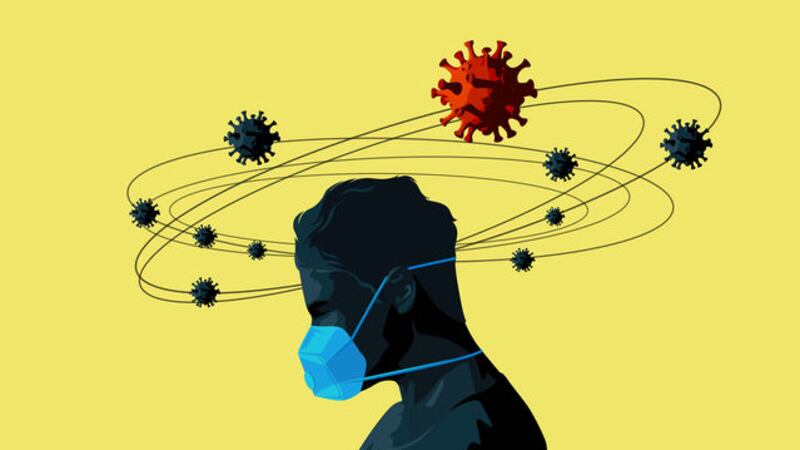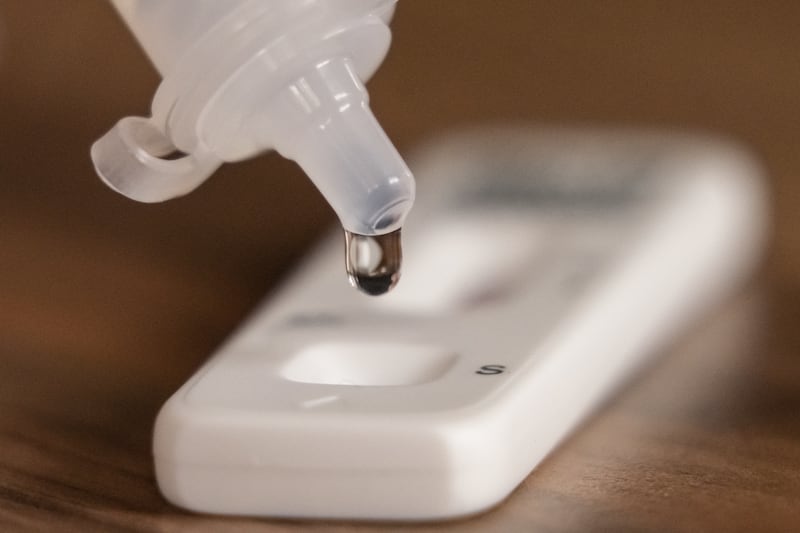The rate of increase of Covid-19 cases has "slowed considerably" from last week, Health Minister Robin Swann has said.
However, speaking at an Executive media conference this afternnon, Mr Swann said the virus had been "growing exponentially in our society with potentially catastrophic consequences for many individuals and families as well as our own health service and indeed our own economy".
He said within days Northern Ireland will exceed the highest number of hospital admissions experienced in the first wave of the pandemic, adding: "This is how grave our current situation is."
Defending tougher restrictions introduced last week, Mr Swann said "sitting back and letting Covid rip unchecked through our community would have been a total abdication of responsibility".
"Restricting human contacts is a proven way of fighting back at Covid-19," he added.
"If we are not going for a full lockdown then restrictions have to be targeted, however complicated that may be, because I have yet to see any real or feasible alternatives to the action that we are now taking.
"Some who are active on the airwaves need to think about that. I am deeply worried about the economic consequences of the pandemic and the actions being taken in response. My heart goes out to the workers and employers who bear the brunt of that."
Mr Swann said 83 care homes have confirmed Covid-19 outbreaks.
"This is a huge concern to me and should be to everyone," he said.
"The blunt truth is that widespread community transmission makes it increasingly hard to keep care homes safe.
"We cannot throw a ring of steel around homes and cut them off entirely from the wider community because quality of life must be balanced with protection of life. However there are steps that we can take and, following the rapid learning initiative that was led by our chief nursing officer, our care home surge plan has been updated and refreshed."
Mr Swann paid tribute to the work of care staff and said his department is finalising a business case for increased pay for the sector.
"That will be challenging, given the current financial pressures and uncertainties, to meet these costs. It will need Executive support but I am determined to do my best to make that happen."
Mr Swann also announced plans for an additional £27 million of funding for care homes to support the costs of the Covid-19 testing programme.
Chief Scientific Adviser Professor Ian Young said there is a "little chink of light" in the fight against coronavirus in that the rate of increase of Covid-19 cases has begun to slow, "likely to reflect the impact of the Northern Ireland-wide household restrictions" and additional restrictions in the Derry and Strabane council area.
He said there remains at a high rate of testing compared with Britain and the Republic of Ireland - close to 30 people out of every 1,000 of the population over the last seven days.
The percentage of positive tests is continuing to rise and is at least 13%.
"This is also showing signs of slowing somewhat but remains at an extremely high level," he said.
Prof Young said the R number is around 1.4, with the aim of reducing it below 1, as close as possible to 0.7.
He said Derry and Strabane continues to have the highest number of cases per 100,000.
Professor Ian Young said more scientific evidence on the pandemic will be published on the Department of Health website.
"I think it is important that we make as much evidence available to the public," he said.
"This is just the beginning, we will be adding a great deal more to the evidence as new evidence emerges."
Prof Young said much focus has been on one summary document, and urged that it is not looked at in isolation but to "look at the totality of the evidence".
He said small changes to the R number become "particularly acute when R gets close to 1".
"R at present is at 1.4, we need it to fall to below 1, to at least 0.9 and preferably 0.7," he said.
"Individual interventions may have a small impact on R but we need to take all of the interventions we can get because it is the collective impact which is going to count.
"Small changes in R are really important as we try to combat the course of this epidemic. Everyone who can contribute something to reducing R is making a real difference to what will happen in the future."
Chief social worker Sean Holland said outbreaks in care homes are rising and also becoming more extensive.
"Care homes are not islands or fortresses, they are part of the community, so when Covid rates increase in that community the threat to care homes increases," he said.
Mr Holland said there are difficult choices to be made in relation to care homes, and risks to be balanced.
"On no issue is this more true than in relation to visiting," he said.
"I fully understand the calls for greater relaxation to visiting restrictions, but at the same time I hear demands for a ring of steel to be placed around homes, effectively locking residents in for their own good.
"We must protect life but we must also protect the quality of life. Many care home residents are living through the last chapter of their lives - to condemn them to do so in total isolation from those that they love and who love them cannot be a situation that we accept for an extended period of time. A balance has to be achieved but that is incredibly difficult."
Mr Holland said that while there had been a drop in referrals to children's services during lockdown, referrals have now exceeded pre-pandemic levels.
"There has also been an increase in the number of children in care - 75 more children in care on October 19 compared with September 13 2019," he said.
Mr Holland said there are also more children on the child protection register, up 113 on December 31 2019.
"Referrals to children's services were greater during the pandemic than when compared with last year and are continuing on an upward trajectory," he said.
"I know a lot of the public commentary about children and young people has been about behaviour. But the real story is that Covid, and the measures we have to take to contain it, have put vulnerable children and families under increased pressure. Economic pressure, certainly, and also the pressures of being in lockdown.
"Families with children with a disability have had been particularly hard hit, partly by the closure of special schools and the loss of services.
"We also know that young care-experienced people are at higher risk of social isolation and mental ill health, and restrictions have been particularly difficult for them."
He said the Department of Health has been involved in the development of a plan for vulnerable children which is out for consultation.








